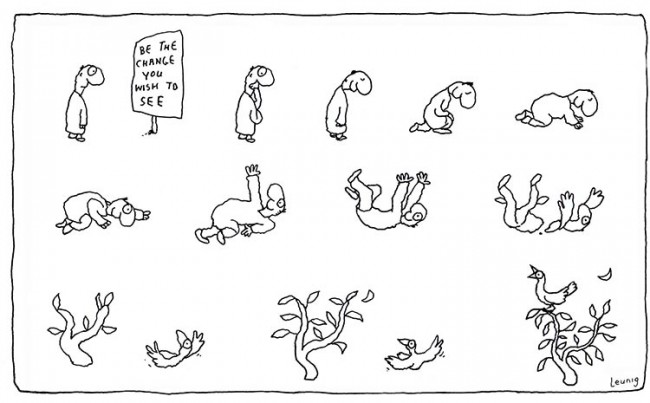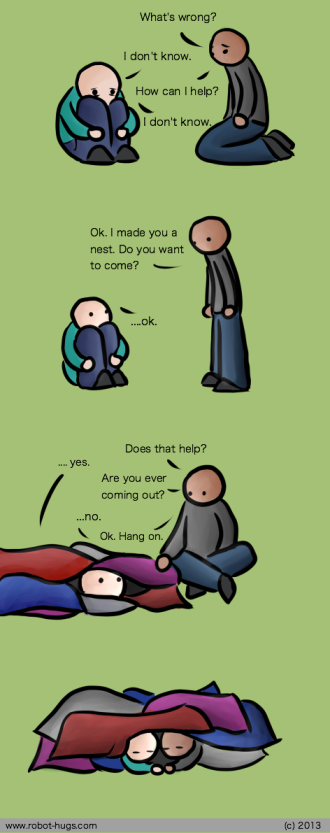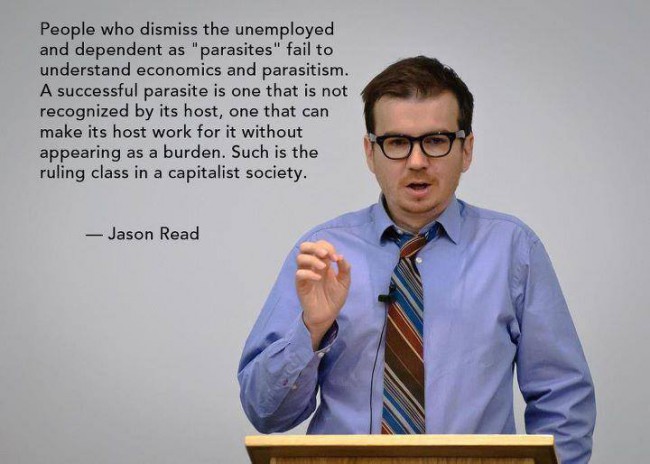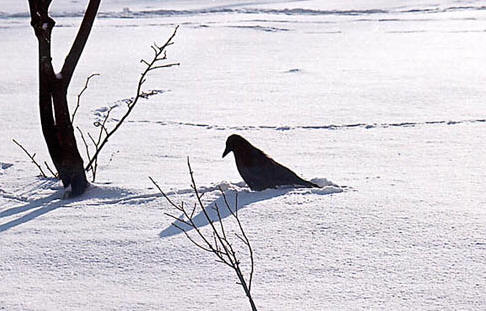The first edition of Shift Magazine, which is all about building resilience for a tumultuous future, and of which I am and will be a regular contributor (writing a trilogy on complexity and then some joyous short stories set two millennia from now), is now available for subscription, online viewing and (for the time being) free download. I’m thrilled to be working on theme-based editions of this edgy, unsentimental but upbeat, youth-oriented publication alongside the likes of fellow ‘collapsniks’ Guy McPherson, Carolyn Baker and Generation Alpha’s Ben Pennings. Please check it out, talk about it, and tell us what you think.
cartoon by Australian cartoonist Michael Leunig
As this winter (and summer in the Southern hemisphere) of extreme weather and record-setting temperatures and precipitation (at both ends of the scales) rolls on, I am sensing a significant shift in the thinking of people who are reasonably informed about what’s going on in the world. Some climate scientists are putting aside their fear of losing their jobs or reputations and starting to tell it like it really is. Many of my progressive friends who were unwilling to accept the inevitability of civilization’s collapse are starting to buy into it. Some others, who were diligently neutral but equally disparaging of ‘doomer’ and ‘denial’ worldviews, have grown more accommodating to us ‘doomers’ and more critical of the deniers. Some progressive media are publishing articles that dare to say we’ve past the tipping point (thanks Kathleen Conmee Breault for the link). And even some deniers are deciding, if only for their kids and grandkids, to look again at the evidence.
It’s just a minor tremor of change, but it’s an important one. At some point, if it continues, the rest of the media, which always trails public opinion, are going to start at least talking about the topic. They are, of course, going to offer the main stage to rebuttals from their right-wing masters, the economic ruling class, and they are, of course, going to wildly oversimplify the topic and the debate. And they’re going to get it mostly wrong, because for the most part they don’t have the time to become informed enough, and are rewarded for dumbing everything down to a dichotomy of two choices and simple decisions.
All we can do is work around the media, and the ruling class, and the politicians and lawyers and police and military authorities wedded to sustaining the status quo to the bitter end. The work of learning essential capacities, building resilient local communities, helping each other heal, and living joyful, exemplary, present lives, will not be helped by, and does not need, this shoddy, disreputable lot. They’re all coming down, soon enough.
________________
PREPARING FOR CIVILIZATION’S END
cormorants in the salish sea – photo by the author
“The Fatal Hypertrophy of Finance”: Jim Kunstler continues to believe (as I do) that the initial undoing of our industrial civilization will be economic, not ecological collapse. And he worries, articulately if somewhat sourly, that:
It is one of the great hidden blessings of our time, actually, that anything organized on the massive scale is doomed to failure. But it is likewise the great mission of our time to prepare to get local and smaller, something we’re not really ready for and certainly not interested in.
Leading Oil Geologist Predicts Peak-Oil Caused Economic Collapse: A former leading geologist for BP says fracking and the tar sands will bring only a minuscule delay to the onset of economic crisis caused by available affordable production falling ever-further behind what’s needed to sustain the current economy. The fracking boom is already ending in many areas, leaving behind economic and ecological disaster. Thanks to David Hodgson for the first link.
Pandemics: The Forgotten Danger: The probability of a global pandemic, possibly virulent (killing rather than just causing illness) and air-borne (and hence highly contagious and essentially impossible to stop), is as high as ever, a ticking time bomb that today only a small cadre of health wonks are shouting about. When that happens, simulations indicate it’s game over for what’s left of the global ‘growth’ economy, as much due to panic (people refusing to go to work) as costs of illness and death of workers.
Do Stories of Place Help Us Prepare for Collapse?: Increasingly, excellent magazines dealing with collapse-related issues, like Orion and Earthlines, include more and more stories about place — the places the authors lived and grew up in, or have come to love, and how they’ve changed — and less and less analytical prose about our current predicaments. Fellow Transitioner and Dark Mountaineer Charlotte Du Cann explores why: Have we run out of things to say about collapse, until it becomes more obvious? Or are these stories to help us remember what we’ve lost, and what we’re losing, so when it all falls apart we’ll have some memories of what was good and bad about industrial civilization, at the grassroots level, when we try to build something better from its ruins?
Collapsnik vs Collapsnik: John Michael Greer and Kevin Carson have both written extensively about the unsustainability of our industrial growth society. The difference, says Lakis Polycarpou, is that John thinks collapse will be manifest through a stepwise delayering of complexity, as complex systems (including the Internet) collapse and must be replaced by simpler, local, less scalable ones. Kevin, on the other hand, is more of a technophile, and believes collapse will be substantially mitigated by more-with-less peer-to-peer innovations (e.g. satellites replacing underwater cables; distributed energy and manufacturing). They both make good points, and the whole discussion is worth a read, but you’ll probably know which point of view I agree with. Thanks to Seb Paquet for the link.
Life at the End of Empire: If you haven’t yet seen Tim Bennett’s amazing 2007 film, it’s available for free streaming through YouTube (donations welcome and DVD is for sale) and can also be viewed along with many other great docs from the good folks at Films for Action. It’s six years old but still prescient, moving, thorough, and hugely informative, though Tim’s become much more pessimistic than he was when he made this.
Predictions for 2014: A very funny, and wise, post by Dmitry Orlov with some predictions, and some predictions about predictions.
But No Alien Space Bats: John Michael Greer invites writers to write (and post links to his comments thread) stories set after the collapse of our civilization. They have to be plausible, but otherwise there are few rules. Why? “Most of what’s kept people in today’s industrial world from coming to grips with the shape and scale of our predicament is precisely the inability to imagine a future that’s actually different from the present.”
________________
And the Best Diet IS…: Lately the ‘food press’ and medical establishment have been arguing vehemently whether the best diet for your health, and particularly to reduce exposure to the epidemic of modern heart and inflammatory diseases and cancers, is paleo, gluten-free, vegetarian, vegan, or something else again. Several good friends are fanatically pro-paleo, while others (including not a few top athletes) are saying vegan diets are best. I’m not going to get into the argument about which was the real pre-civilization diet of humans. But there is a strong consensus from health experts of all stripes on one thing: Though processed and chemical-laden foods and refined sugars are generally bad for your health, there is no one ‘best’ diet for everyone; every body is different and only monitoring and managing your own nutrition and health will lead to an ideal diet for your body. Here’s a doctor (thanks to Chris Lott for the link) who argues for a paleo-type diet. And here’s another doctor with what I think is a more balanced view (that paleo is better than most modern diets but unnecessarily restrictive for many). My current high-variety vegan diet includes whole grains and beans and potatoes and other carbs that are anathema to those on paleo or gluten-free diets, but I have yet to see any compelling medical evidence that it’s not the best for me, and since I’ve been monitoring my health and fitness for 40 years, I know it’s working for me. Don’t take any doctor’s advice who says there’s one best diet; do your own research, wean yourself off dependence on generalizing health care ‘experts’ proffering easy answers, and find what works best for you. [PS: And if you use supplements to compensate for possible deficiencies in your diet, you might want to read this.]
The Sacred Ritual of Walking: Venkat Rao explains, for the benefit of us un-spiritual types, that sacred rituals are of four types: grounding, centring, connecting, and collecting. He then provides an intriguing exercise to assess which type most appeals to you.
When the Purpose of Meeting is Not to Agree on Actions: My friend Amanda Fenton summarizes some great thoughts on the value of conversation, connection and networking that yields no action plans, decisions or “solutions”. Sometimes, sharing and listening and learning is enough; sometimes, “the dialogue is the action”.
Managing Our Inner Critic: Mark O’Connell cautions writers that the self-doubting Thomas in each of us has its value and its hazards: “The inner critic is actually an indispensable element of any writer’s working life; it is the immune system, the necessary resistance against the toxicity of bad writing. Excessive self-doubt is therefore like a sort of autoimmune disease, caused by an overactive and overpowerful inner critic: the cure becomes the condition.” Thanks to Bob Lasiewicz for the link.
Gabor Maté on the Childhood Attachment-Adult Illness Connection: The eloquent Vancouver doctor expounds on how our adult bodies betray childhood trauma and neglect. No magic answers (not even ayahuasca), but sometimes just knowing why you’re suffering is a start. He has some interesting comments on our cultural malaise, and our two fundamental emotional needs (for attachment and authenticity — connection to others and to our selves) as well. Well worth an hour’s attention.
Tiny Houses: The Tiny House movement is driving some great innovations in sufficient and resilient living. Self-constructed homes, often from local, renewable materials, from 100-500sf (10-45 m2) are proving to be adequate and delightful for many small families, and not just for the poor. They also offer one of the few intelligent ways of dealing with soaring and chronic homelessness. And you can even take some of them on the road. Thanks to David Hodgson for the second link, and Aleah Sato for the third.
Working Better: A concise summary of the workings of the cooperative and democratic alternative to capitalism represented by Mondragon. Thanks to Michel Bauwens for the link.
________________
POLITICS AND ECONOMICS AS USUAL
image of USM Professor Jason Read, original source unknown, via Michael Nenonen
(It’s hard to know what to put in this space anymore. If you read what Snowden and other whistle-blowers are saying, what Wikileaks and their kin are reporting, and what your area’s indymedia are writing (on issues of local importance), you know what’s going on. So lately I’m focusing here on “big picture” issues and perspectives, rather than the latest particular outrages of the wealthy, the powerful, and their lackeys.)
The Servant Economy: The extreme influence of the wealthy 1% on the political process has led to dangerous levels of inequality not seen even in the robber baron days. Author Jeff Faux’s new book argues that, as the economy stumbles, the result will be the large-scale impoverishment of the remaining 99% and the creation of a “servant economy” — undignified, insecure, underpaid and humiliating to the vast majority reduced to slavery to the tiny minority who still have wealth. Thanks to David Hodgson for the link.
Wikileaks Reveals Corporatist Plan for Battling Tar Sands (and Other) “Opponents”: A recent wikileaks release reveals that Stratfor, a Texas-based “security intelligence” firm, was hired by Big Oil to advise them how to discredit and defeat opponents to the Tar Sands, using a mix of psychological warfare, deceptive PR, pressuring of police authorities, political lobbying, and/or just ignoring them, depending on which category the opposing group fell into and how much a “threat” they present. This was helped, it now appears, with some of the $1/2 billion in subsidies the Harper government “gave” Big Oil for their “green” PR campaigns. The intelligence capability of Stratfor and its cohorts dwarfs what the bumbling NSA and CIA can do, but the media (owned mostly by clients of Stratfor et al) don’t report on their atrocious actions. Wikileaks has also revealed that this gang of lavishly paid private snoops and goons were hired to undermine the work of the Bhopal victims, the Occupy movement, PETA, and Deep Green Resistance, among others, and showed no hesitation to use falsified information and expensive media campaigns to do so, in the interests of their corporate clients. Thanks to Sam Rose for the third link above.
________________
FUN AND INSPIRATION
cartoon from xkcd
Why Poor People’s Seemingly Bad Decisions Make Perfect Sense: A moving portrayal of life by a member of the swelling ranks of the working poor explains why smoking, eating fast food and processed foods, getting ripped off by “payday loan” usurers, and not paying off credit cards, are sensible, desperate, inevitable coping mechanisms for those who simply don’t have better options.
Murmuration: Mind-blowing impromptu video of massing starlings. Thanks to Beth Patterson for the link.
The World’s Worst Graphics: Mind-bogglingly-bad visualizations. Thanks to Tree for the link.
Find Your Spirit Animal: An entertaining quiz. (I’m spider/crow/owl.) Thanks to Seb Paquet for the link.
A Different Model: Terrific short video about ideal body image and what happens when you confront our ideas about it. Thanks to Eric Lilius for the link.
What We’re Capable Of: From the same site as the video above, a short moving video about a dog rescue, and a dog’s heart. Warning: this will make you cry. Please support your local animal rescue organizations.
What Blogging Was, and Is: David Weinberger, one of the pioneers of the form, talks about why blogging was so important and wonders, now that blog readership has fallen so much, about its future. A host of long-term bloggers (including me, but especially check out David’s Cluetrain Manifesto co-author Doc Searls’ great response) have chimed in with interesting comments. Thanks to Nancy White for the link.
More-Than-Human Play: A kitten and dolphin meet. Thanks to Bernie DeKoven for the link. And if you feel the need for more cute kitties, here is Abercrombie cat, and a cat editorial.
Let the Love Wash Over Us: Amazing gospel music video. We sing this song with its simple, stunning harmonies in our local singing circle, but Rickie Byars Beckwith and Agape take it to another level.
The Canadian Accent: No, it’s not aboot how we say things, eh? Russell Peters, back when he was funny, explains how we Canadians sound to newcomers.
Yes We Can (Farsi Edition): Slick video produced for President Rouhani of Iran shows that the same propaganda war against citizens is being waged, in much the same way, everywhere now. Thanks to Raffi for the link.
The Entire IPCC Report in 19 Illustrated Haiku: Oceanographer Greg Johnson reviews this gloomy report and distils it into 19 poems which he illustrates himself. Thanks to Tree for the link.
________________
THOUGHTS OF THE MONTH
From PS Pirro, What You Decide to Call Good:
Do you start with the unsettling of the Americas, the creation
of an empire built on stolen Aztec gold, do you count the trees
or the dollars? Do you hold Sinclair’s blood-soaked Jungle
next to Bill’s bright white Microsoft, or do you look at the
poisoned mines in the Congo where children with the cut of the
whip across their backs dig for the columbite-tantalite to outfit
your Android? Complexity, complicity, they will get you every
time. Because so much depends on what you compare. So much
depends on what you decide to call good.
From Nassim Taleb, on the idiocy of our fascination with neo-phrenologist brain scans:
Studying neurobiology to understand humans is like studying ink to understand literature.
From Kevin Tucker, back in 2005, explaining that the first creatures humans “domesticated” were other humans (Thanks to Decivilized for the link):
Domestication is the civilizing process. It is about turning wild humans into something for civilized use. It turns individuals into farmers, peasants, workers, bosses, police and soldiers, just as it turns forests and wetlands into gardens, and gardens into fields surrounding cities, and fields into deserts. It is about taming humans for domestic life.
From Tim Bennett, This Should Not Be (image below from his post, originally from manataka.org):
Isn’t it amazing? I get up and it’s 4° F below and still there are gulls in the sky, still there are crows looking for handouts, still there are deer stepping quietly across the driveway trying not to wake anyone. How do they do it, I wonder, and why can’t I? Over the years, I’ve schooled myself to walk barefoot on the ground, and can now easily do so when it’s 15-20°F. I go out without coat and hat for as long as I can, and let the wind rip right through me. It seems that story and fear and culture and belief are as much a factor as anything else, when it comes to our experience of cold. So I work at that level, knowing that I won’t always be able to control my external circumstances, knowing that the stories inside of me will determine my experience just as much as any outside force, knowing that if I can meet things like cold, hunger, and discomfort without fear and judgment that that will give me an edge, knowing that Nietzsche was right about what makes me stronger. In the end, it’s my resistance to what’s so – whether it be cold, heat, biting ants, or feelings of anger or grief- that causes me all of my suffering. The story “this should not be” creates so much of my upset. And it’s a silly story, don’t you think, as anything that “should not be” surely “is” already. The cold surely “is.” And I think the gulls and crows and deers just take it as such, with no thought of personal punishment, no offense, no inner mumbling of “this should not be”. Thank you, teachers.
And more awesomeness from PS Pirro, Love Like Water:
Perhaps it is too much to ask of love
that it surround us always, that it permeate
our days and leave its watermark on all we do.
Perhaps it is more of a privilege than we care to think,
to love the world and all of its daily obligation,
to rise and meet the cold concrete sky
with the same face we offer to the gilding sun.
Perhaps it diminishes love to expect so much of it,
that it solve all our conflict and soften every hard edge,
love like water, carving landscapes we cannot
always fathom, canyons we cannot always cross.











Love the cartoons, and the links as always. Shift looks great and glad you’re part of it. Not sure I qualify as a collapsenik, but think that’s just a lack of confidence in calling things as I see them most days. Ben.
So much to check out here! I’ll have to wait ’til weekend when I can put my feet up and indulge myself :-)
I love how SHIFT has turned out, and am looking forward to see what pops up in the next issue. Great to see a diversity of background, age, and angles present in this mag, and grateful for the compassionate honesty that provides a refreshing break from the hopium or doom dichotomy.
Having said that, I self-identify as a soft-core doomer these days (after much internal wrangling, pressured mainly by a desire not to be seen as a loony by those I care about), and no longer protest at the label when thrust upon me by others. I just can’t lie about what I think anymore for the sake of others’ delicate sensibilities – I won’t be helping them any when the shift hits the fan if I pretend I can’t see the writing on the wall.
Starfish turning to goo and crabs climbing up anchor ropes to escape the toxic seabed – these are the things keeping me awake this week. How anyone cannot see we are fucked is beyond me. It seems almost like an ecocidal case of “first they came for the Jews…”, but in this case we’re a few notches lower on the list than starfish, and we can’t seem to identify with their plight. Can’t see many of us working to protect the canaries in the coalmine. But chin up – I’m adopting a totem animal and figuring out how I can get others to do likewise…
These link posts of yours, and your commentary, tho less frequent than when I first found your site so many years ago, remain every bit as valuable to me and as welcome as ever. They always lead me to unexpected places. And sometimes to unexpected poems. Thank you for doing what you do.
FYI I’m an owl, which fits, as it’s my avatar :-)
I also scored highly on hawk – I do often leave out life’s mundane tasks…(but yay for photographic memory and being a messenger of the spirits!)
That was a bit of fun – but not a bad match at all, surprisingly! And I have a weaknesses for self-discovery quizzes…